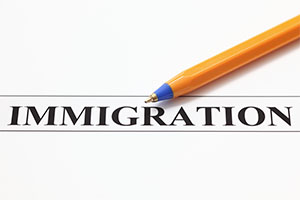Overcoming Unlawful Presence Bars
 One of the many reasons someone can be prevented from getting a green card or being let into the United States is if they have accumulated more than 180 days of "unlawful presence," or "UP" for short. If you have between 180 and 364 days of UP, you are barred from re-entering the US for 3 years (the 3-year bar). If you have one year or more of UP, you are barred from re-entering the US for 10 years (the 10-year bar). UP is triggered when you leave the country.
One of the many reasons someone can be prevented from getting a green card or being let into the United States is if they have accumulated more than 180 days of "unlawful presence," or "UP" for short. If you have between 180 and 364 days of UP, you are barred from re-entering the US for 3 years (the 3-year bar). If you have one year or more of UP, you are barred from re-entering the US for 10 years (the 10-year bar). UP is triggered when you leave the country.
If you know or expect will be subject to one of the bars, there are things you can do to overcome them.
1) Argue it Doesn’t Apply to YouIf an immigration official has raised the question of whether you have more than 180 days unlawful presence, but has not yet made a final decision in your case, you can present facts showing you this ground of inadmissibility does not apply to you. If a final decision has already been made, in some situations, you might be able to argue that a prior decision was wrong.
Depending on the facts of your case, you could try to show that you had some form of immigrant or non-immigrant status during that time, that you had an application for change or extension of status pending during that time, or that you left the US at some point before reaching 180 days UP. If you have questions about what arguments might work in your case and at what point in the process to present these arguments, contact a NJ immigration attorney at LS&P Lawyers.
2) Apply for a WaiverIf a person has UP, they can still be allowed to enter the country as an immigrant or non-immigrant if they can show that keeping them out of the US would result in "extreme hardship" to a "qualifying relative."
Who is a Qualifying Relative?With UP waivers, qualifying relatives are only spouses or parents who are US Citizens or Lawfully Permanent Residents (LPRs). It does not include children. If you don’t have a spouse or parent who is a US citizen or a LPR, you can’t apply for this waiver.
What is Extreme Hardship?"Extreme hardship" means suffering that is "unusual or beyond that which would normally be expected" when a family member leaves the US. Some of the factors immigration officials consider are the qualifying relative’s family ties to the US and abroad, country conditions in the country of the relative’s relocation and their ties to that country, financial impact of departure from the United States, and significant conditions of health and unavailability of suitable medical care. Immigration officials consider other factors too, looking at all potential sources of hardship. Because of that, it is very important for the qualifying relative to provide as much information as possible about what will happen to them if they are left in the US without the immigrant, and what will happen to them if they have to go abroad with the immigrant when they leave.
How to ApplyIn order to apply for the waiver, you must fill out form I-601 or I-601A. Form I-601A is only used if you are in the US and plan to leave the US to get a visa abroad, but you want to get approval of a waiver before leaving the US. Form I-601 is used for all other reasons. Both forms are available at www.uscis.gov/forms. As of April 2014, USCIS was taking 4-6 months to process I-601 applications. Tips at putting together a successful waiver can be found elsewhere on this website.
If you have questions about how the law applies to your case, contact a lawyer at LS&P Lawyers.
 Lubiner Schmidt and Palumbo Home
Lubiner Schmidt and Palumbo Home



